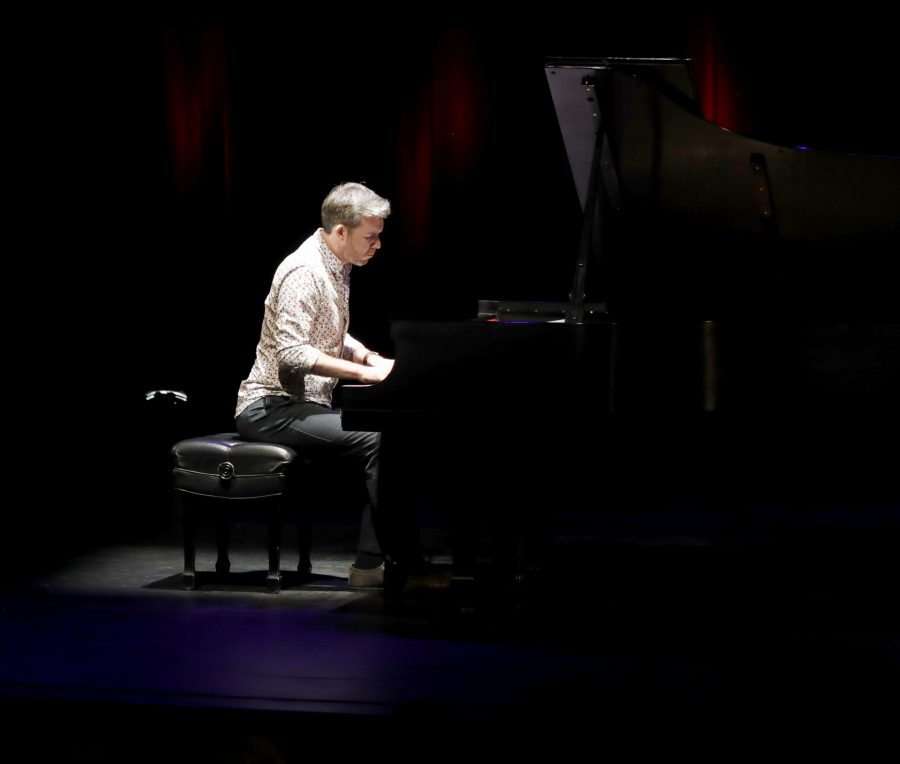Originally a classical pianist, Gwilym Simcock said he has developed his skills and explored other music genres such as jazz and composition.
Many of the tunes in his new album “Near and Now,” are dedicated to his “heroes” in the jazz world. Each of the pieces he played were dedicated to a fellow pianist of his such as Billy Childs, Brad Mehldau, Russell Ferrante, Egberto Gismonti and Les Chisnall, who was his first jazz teacher, according to the Williams Center for the Arts program.
Playing since his early childhood, Simcock said in an interview that he owes his musical beginnings to his parents.
“When I was a child there was a lot of music in the house,” he said. “My father was a nonprofessional church organist, who would always sit at home and play on the piano, and my mom was also very creative but was into theater. They both gave me every opportunity to play music with [our] piano and organ…I was always able to play and be surrounded by music.”
Simcock shared that his mother gave up her job and homeschooled him, which was a very valuable part of his upbringing as well.
“When I was nine I went to music school, and I did that for nine years playing piano, french horn, and composing music as well. You get to do four to five hours of music a day, which gives you the opportunity when you’re eighteen to do music in college.”
Once Simcock went to college for music in London, he began meeting people who would help get him to where he is today.
“I spent many years in London being part of a scene and meeting musicians. You start to make contacts and make relationships that will carry on into the rest of your life,” he said.
One major influence and hero in Simcock’s life is jazz musician Pat Metheny, whom Simcock started listening to when he was 15 years old. This became one of his first introductions into jazz. Simcock explained that, once he started to build a reputation for himself, he got an email from Metheny saying that he’d been checking out his music.
“We had a correspondence and a couple years down the line he was doing a concert in London and asked if I’d like to go. I then asked if he had any extra time to play music together. We played some duets together. It was daunting but exciting,” Simcock said.
After that encounter, Metheny and Simcock toured the world together, according to the Williams Center for the Arts program.
Simcock said that now that he is a professional pianist with performances around the world, he has realized some of the challenges in his career.
“Trying to break into new territories is [a] challenge,” he said. “When you travel across the world and not many people come [to your performance], that’s difficult. To build up a reputation is another one. So is being away from home.”
Simcock also spoke about performance anxiety.
“[It] is very hard for me in this situation it’s very hard because I’m on stage [by] myself,” he said. “When you’re with others it’s not as bad. Playing the music is fine but if you’re feeling nervous you get the voices in your head that people are going to judge you.
“It takes guts to share your weaknesses,” he added. “It’s a very important thing to do.”
While Simcock shared some of the downsides of being an internationally recognized musician, he also shared many of the positives of his career.
“It is a massive privilege to be doing what I’m doing. Getting to play music is such a lovely thing to do,” he said.
He also shared his love of collaborating with other musicians, noting that communication is a vital part of being a jazz musician.
“I enjoy getting to work with different musicians. You’ve got a goal to put music together with people you’ve never met,” he explained. “Jazz is communal and improvisational because you do it with other people and you’re responding to and are inspired by other people’s ideas. Playing with other musicians and having that conversation through the language of music is the fun part of it.”
According to Simcock, “the ultimate aim is to gain respect from [audiences] and from people who are in my career world. The most important thing is to feel that you have made it to your art form—that you tried to do something to as high of a quality as possible and that you made an individual contribution to the art form.”




































































































